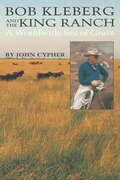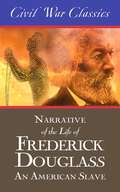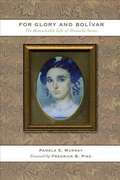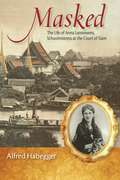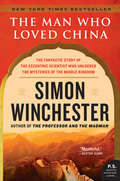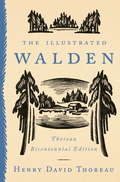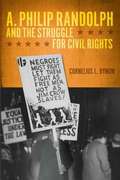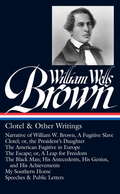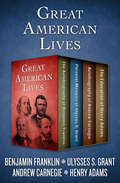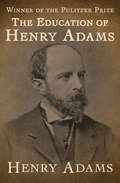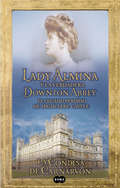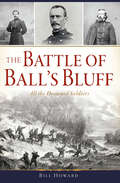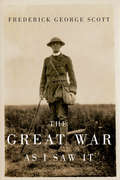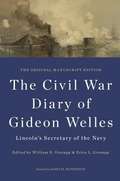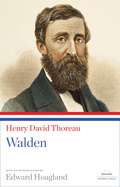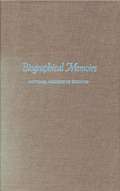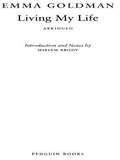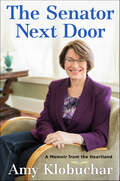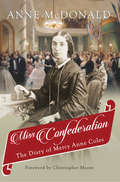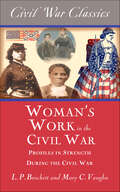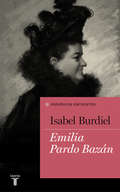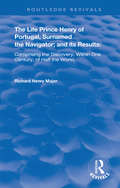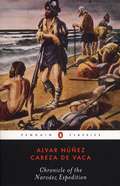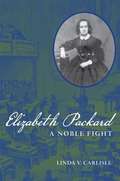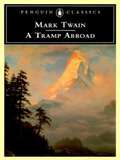- Table View
- List View
Bob Kleberg and the King Ranch: A Worldwide Sea of Grass
by John Cypher&“Combines a biography of Kleberg . . . with the story of the postwar boom years that changed the King Ranch . . . into an international corporate agribusiness.&” —Houston Chronicle Ranching on the vast scale that Texas is famous for actually happened at King Ranch, a sea of grass that ultimately spread its pastures to countries around the globe under the fifty-year leadership of Bob Kleberg. This absorbing biography, written by Kleberg's top assistant of many years, captures both the life of the man and the spirit of the kingdom he ruled, offering a rare, insider's view of life on a fabled Texas ranch. John Cypher spent forty years (1948–1988) on King Ranch. In these pages, he melds highlights of Kleberg&’s life with memories of his own experiences as the &“right hand&” who implemented many of Kleberg's grand designs. In a lively story laced with fascinating anecdotes, Cypher both recounts his worldwide travels with Kleberg as the ranch expanded its holdings around the world, and describes timeless, traditional tasks such as roundup at the home ranch in Kingsville. Chronicling Kleberg&’s accomplishments as well as his legendary lifestyle, which included friendships not merely with the rich and famous but also with Queen Elizabeth, who shared his love of horse racing, this book is essential reading for anyone interested in ranching and one of its most famous practitioners. &“Cypher[&‘s] easy conversational style makes life on a working ranch, the care and feeding of visiting celebrities and the field of international agribusiness both understandable and entertaining.&” —San Antonio Express-News &“Probably the best of what will ever be known of the inner Bob Kleberg.&” —East Texas Historical Journal
Narrative of the Life of Frederick Douglass: An American Slave (Civil War Classics)
by Frederick DouglassTo commemorate the 150th Anniversary of the end of the Civil War, Diversion Books is publishing seminal works of the era: stories told by the men and women who led, who fought, and who lived in an America that had come apart at the seams. One of the most important figures of the Civil War, Frederick Douglass, was born into slavery but rose to become a tremendous orator, an impassioned abolitionist, and a representative of all who remained voiceless through slavery and oppression. His narrative resonates today with its eloquence, its incendiary history, and its profound and moving arguments for the humanity, and the equality, of Americans.
For Glory and Bolívar: The Remarkable Life of Manuela Sáenz, 1797-1856
by Pamela S. MurrayShe was a friend, lover, and confidante of charismatic Spanish American independence hero Simon Bolivar and, after her death, a nationalist icon in her own right. Yet authors generally have chosen either to romanticize Manuela Saenz or to discount her altogether. <P><P>For Glory and Bolivar: The Remarkable of Life of Manuela Saenz, by contrast, offers a comprehensive and clear-eyed biography of her. Based on unprecedented archival research, it paints a vivid portrait of the Quito-born "Libertadora," revealing both an exceptional figure and a flesh-and-blood person whose life broadly reflected the experiences of women during Spanish America's turbulent Age of Revolution. Already married at the time of her meeting with the famous Liberator, Saenz abandoned her husband in order to become not only Bolivar's romantic companion, but also his official archivist, a member of his inner circle, and one of his most loyal followers. She played a central role in Spanish South America's independence drama and eventually in developments leading to the consolidation of new nations. Pamela Murray, for the first time, closely examines Saenz's political trajectory including her vital, often-overlooked years in exile. She exposes the myths that still surround her. She offers, in short, a nuanced and much-needed historical perspective, one that balances recognition of Saenz's uniqueness with awareness of the broader forces that shaped this dynamic nineteenth-century woman.
Masked
by Alfred HabeggerA brave British widow goes to Siam and-by dint of her principled and indomitable character-inspires that despotic nation to abolish slavery and absolute rule: this appealing legend first took shape after the Civil War when Anna Leonowens came to America from Bangkok and succeeded in becoming a celebrity author and lecturer. Three decades after her death, in the 1940s and 1950s, the story would be transformed into a powerful Western myth by Margaret Landon's best-selling book "Anna and the King of Siam" and Rodgers and Hammerstein's musical "The King and I. " But who was Leonowens and why did her story take hold? Although it has been known for some time that she was of Anglo-Indian parentage and that her tales about the Siamese court are unreliable, not until now, with the publication of "Masked," has there been a deeply researched account of her extraordinary life. Alfred Habegger, an award-winning biographer, draws on the archives of five continents and recent Thai-language scholarship to disclose the complex person behind the mask and the troubling facts behind the myth. He also ponders the curious fit between Leonowens's compelling fabrications and the New World's innocent dreams-in particular the dream that democracy can be spread through quick and easy interventions. Exploring the full historic complexity of what it once meant to pass as white, "Masked" pays close attention to Leonowens's midlevel origins in British India, her education at a Bombay charity school for Eurasian children, her material and social milieu in Australia and Singapore, the stresses she endured in Bangkok as a working widow, the latent melancholy that often afflicted her, the problematic aspects of her self-invention, and the welcome she found in America, where a circle of elite New England abolitionists who knew nothing about Southeast Asia gave her their uncritical support. Her embellished story would again capture America's imagination as World War II ended and a newly interventionist United States looked toward Asia. "
The Man Who Loved China
by Simon WinchesterIn sumptuous and illuminating detail, Simon Winchester, the bestselling author of The Professor and the Madman ("Elegant and scrupulous"--New York Times Book Review) and Krakatoa ("A mesmerizing page-turner"--Time) brings to life the extraordinary story of Joseph Needham, the brilliant Cambridge scientist who unlocked the most closely held secrets of China, long the world's most technologically advanced country.No cloistered don, this tall, married Englishman was a freethinking intellectual, who practiced nudism and was devoted to a quirky brand of folk dancing. In 1937, while working as a biochemist at Cambridge University, he instantly fell in love with a visiting Chinese student, with whom he began a lifelong affair.He soon became fascinated with China, and his mistress swiftly persuaded the ever-enthusiastic Needham to travel to her home country, where he embarked on a series of extraordinary expeditions to the farthest frontiers of this ancient empire. He searched everywhere for evidence to bolster his conviction that the Chinese were responsible for hundreds of mankind's most familiar innovations--including printing, the compass, explosives, suspension bridges, even toilet paper--often centuries before the rest of the world. His thrilling and dangerous journeys, vividly recreated by Winchester, took him across war-torn China to far-flung outposts, consolidating his deep admiration for the Chinese people.After the war, Needham was determined to tell the world what he had discovered, and began writing his majestic Science and Civilisation in China, describing the country's long and astonishing history of invention and technology. By the time he died, he had produced, essentially single-handedly, seventeen immense volumes, marking him as the greatest one-man encyclopedist ever.Both epic and intimate, The Man Who Loved China tells the sweeping story of China through Needham's remarkable life. Here is an unforgettable tale of what makes men, nations, and, indeed, mankind itself great--related by one of the world's inimitable storytellers.
The Illustrated Walden: Thoreau Bicentennial Edition
by Henry David ThoreauTo coincide with the bicentennial of Thoreau's birth and TarcherPerigee's publication of Expect Great Things: The Life of Henry David Thoreau, here is a sumptuous rediscovery edition of the first illustrated volume of Thoreau's classic, as originally issued in 1897.In 1897, thirty-five years after Thoreau's death, Houghton Mifflin issued a two-volume "Holiday Edition" of Walden illustrated with thirty remarkable engravings, daguerreotypes, and period photographs. In 1902 the publisher collected the work into a single volume. Now, to mark the bicentennial of Thoreau's birth in 1817, this timeless landmark is reproduced with all of the original illustrations and the complete text of his mystical, practical, magisterial record of a life in the woods.From the Trade Paperback edition.
A. Philip Randolph and the Struggle for Civil Rights
by Cornelius L. BynumA. Philip Randolph's career as a trade unionist and civil rights activist fundamentally shaped the course of black protest in the mid-twentieth century. Standing alongside individuals such as W. E. B. Du Bois and Marcus Garvey at the center of the cultural renaissance and political radicalism that shaped communities such as Harlem in the 1920s and into the 1930s, Randolph fashioned an understanding of social justice that reflected a deep awareness of how race complicated class concerns, especially among black laborers. Examining Randolph's work in lobbying for the Brotherhood of Sleeping Car Porters, threatening to lead a march on Washington in 1941, and establishing the Fair Employment Practice Committee, Cornelius L. Bynum shows that Randolph's push for African American equality took place within a broader progressive program of industrial reform. Some of Randolph's pioneering plans for engineering change--which served as foundational strategies in the civil rights movement of the 1950s and 1960s--included direct mass action, nonviolent civil disobedience, and purposeful coalitions between black and white workers. Bynum interweaves biographical information on Randolph with details on how he gradually shifted his thinking about race and class, full citizenship rights, industrial organization, trade unionism, and civil rights protest throughout his activist career. "
William Wells Brown: Clotel & Other Writings
by William Wells BrownBorn a slave and kept functionally illiterate until he escaped at age nineteen, William Wells Brown (1814-1884) refashioned himself first as an agent of the Underground Railroad, then as an antislavery activist and self-taught orator, and finally as the author of a series of landmark works that made him, like Frederick Douglass, a foundational figure of African American literature. His controversial novel Clotel; or, the President's Daughter (1853), a fictionalized account of the lives and struggles of Thomas Jefferson's black daughters and granddaughters, is the first novel written by an African American. This Library of America volume brings it together with Brown's other groundbreaking works: Narrative of William W. Brown: A Fugitive Slave, Written by Himself (1847), his first published book and an immediate bestseller, which describes his childhood, life in slavery, and eventual escape; later memoirs charting his life during the Civil War and Reconstruction; the first play (The Escape; or, A Leap for Freedom, 1858), travelogue (The American Fugitive inEurope, 1855), and history (The Black Man, His Antecedents, His Genius, and His Achievements, 1862) written by an African American; and eighteen speeches and public letters from the 1840s, 50s, and 60s, many collected here for the first time.
Great American Lives: The Autobiography of Benjamin Franklin, Personal Memoirs of Ulysses S. Grant, Autobiography of Andrew Carnegie, and The Education of Henry Adams
by Ulysses S. Grant Henry Adams Andrew Carnegie Benjamin Franklin VBrilliant, captivating, and unforgettable memoirs from four of the greatest minds in American history. Penned between 1771 and 1790 and published after his death, TheAutobiography of Benjamin Franklin is one of the most acclaimed and widely read personal histories ever written. From his youth as a printer&’s assistant working for his brother&’s Boston newspaper through his own publishing, writing, and military careers, his scientific experiments and worldwide travels, his grand triumphs and heartbreaking tragedies, Franklin tells his story with aplomb, bringing to life the flesh-and-blood man behind the American icon. Completed just days before his death, Ulysses S. Grant&’s Personal Memoirs is a clear and compelling account of his military career, focusing on two great conflicts: the Mexican–American War and the Civil War. Lauded for its crisp and direct prose, Grant&’s autobiography offers frank insight into everything from the merits of the war with Mexico to the strategies and tactics employed by Union forces against the Confederacy to the poignancy of Grant&’s meeting with General Lee at Appomattox Court House. Documenting a world of tariffs, insider deals, and Wall Street sharks as well as his stunning rise from bobbin boy to steel baron, The Autobiography of Andrew Carnegie opens a window into the great industrialist&’s decision-making process. His insights on education, business, and the necessity of giving back for the common good set an inspirational example for aspiring executives and provide a fitting testament to the power of the American dream. The Education of Henry Adams is the Pulitzer Prize–winning memoir of a brilliant man reckoning with an era of profound change. The great-grandson of President John Adams and the grandson of President John Quincy Adams, Henry Adams possessed one of the most remarkable minds of his generation. Yet he believed himself fundamentally unsuited to the era in which he lived—the tumultuous period between the Civil War and World War I. Written in third person, this uniquely unclassifiable autobiography is the Modern Library&’s number-one nonfiction book of the twentieth century. This ebook has been professionally proofread to ensure accuracy and readability on all devices.
The Education of Henry Adams: An Autobiography (The\best Sellers Of 1919 Ser.)
by Henry AdamsThe Modern Library's number-one nonfiction book of the twentieth century and winner of the Pulitzer Prize: The acclaimed memoir of a brilliant man reckoning with an era of profound change The great-grandson of President John Adams and the grandson of President John Quincy Adams, Henry Adams possessed one of the most remarkable minds of his generation. Yet he believed himself fundamentally unsuited to the era in which he lived--the tumultuous period between the Civil War and World War I. One of the finest autobiographies ever written, The Education of Henry Adams is a remarkable and uniquely unclassifiable work. Written in third person and originally circulated in a private edition to friends and family only, it recounts Adams's lifelong search for self-knowledge and moral enlightenment and bears witness to some of the most significant developments in American history. This ebook has been professionally proofread to ensure accuracy and readability on all devices.
Lady Almina y la verdadera Downton Abbey: El legado perdido de Highclere Castle
by Lady Fiona CarnarvonLady Fiona Carnarvon, la octava condesa, relata la extraordinaria historia del auténtico Downton Abbey, aún más fascinante que la ficción. Lady Fiona Carnarvon se convirtió en señora de Highclere Castle -escenario de la exitosa serie Downton Abbey- hace ocho años. En este periodo ha llegado a sentir fascinación por la interesante historia de Highclere y por las extraordinarias personas que han residido allí a lo largo de los siglos. Pero una persona en particular captó el interés de Fiona: lady Almina, la quinta condesa de Carnarvon. Almina fue la hija ilegítima del magnate de la banca Alfred de Rothschild. Fue su única hija y objeto de devoción por su parte. A los diecinueve años, con una inmensa dote, se casó con el quinto conde de Carnarvon. Al principio, la vida en Highclere transcurrió en una vertiginosa sucesión de suntuosos banquetes para quinientas personas e incluso algún que otro invitado real. Almina supervisó a ochenta empleados, muchos de los cuales procedían de familias que llevaban generaciones trabajando en Highclere. Pero el estallido de la Primera Guerra Mundial cambió para siempre la vida en Highclere, tanto arriba como abajo. Los avatares de la historia hicieron que Almina y el personal de Highclere se vieran envueltos en uno de los periodos más turbulentos del pasado siglo. Almina tuvo que hacer acopio de todo su arrojo para garantizar la supervivencia de su familia, del personal y del castillo. Esta es la extraordinaria historia de una época desaparecida. Sin embargo, Highclere permanece y en este libro lady Carnarvon narra la andadura de Almina y de su familia, el legado y la historia de una de las casas solariegas victorianas más exquisitas de Inglaterra.
The Battle of Ball's Bluff: All the Drowned Soldiers (Civil War Series)
by Bill HowardThree months after the Civil War's first important battle at Manassas in 1861, Union and Confederate armies met again near the sleepy town of Leesburg. What began as a simple scouting mission evolved into a full-scale battle when a regiment of Union soldiers unexpectedly encountered a detachment of Confederate cavalry. The Confederates pushed forward and scattered the Union line. Soldiers drowned trying to escape back to Union lines on the other side of the Potomac River. A congressional investigation of the battle had long-lasting effects on the war's political and military administration. Bill Howard narrates the history of the battle as well as its thorny aftermath.
The Great War as I Saw It
by Frederick George Scott Mark G. McgowanA fifty-three-year-old Anglican priest and poet when the First World War broke out, Frederick George Scott was an improbable volunteer, but also an invaluable war memoirist about life at the front. Enlisting at the very beginning of the conflict and serving on the Western Front until the Armistice, Scott became the most decorated Canadian chaplain. A High Anglican and staunch British imperialist described by one of his fellow officers as "an old snob of the old school," Scott also defied stereotypes, often rejecting the privileges he was entitled to as an officer and insisting on being at the frontlines with the rank-and-file soldiers, with whom he felt genuine kinship. As a result, he was seriously wounded in the autumn of 1918, near the end of the war. The Great War as I Saw It is an idiosyncratic portrait by a man of strong religious convictions witnessing the horror of modern warfare. In evocative prose shaped by his background as a poet, Scott moves between lighthearted moments and dark tragedy, including his wrenching account of searching for his own son's body in a ruined battlefield. Rich in detail, it is one of the most diverse and complete first-hand accounts of the war ever published.
The Civil War Diary of Gideon Welles, Lincoln's Secretary of the Navy: The Original Manuscript Edition
by Gideon Welles William E. Gienapp Erica L. GienappGideon Welles's 1861 appointment as secretary of the navy placed him at the hub of Union planning for the Civil War and in the midst of the powerful personalities vying for influence in Abraham Lincoln's cabinet. Although Welles initially knew little of naval matters, he rebuilt a service depleted by Confederate defections, planned actions that gave the Union badly needed victories in the war's early days, and oversaw a blockade that weakened the South's economy. Perhaps the hardest-working member of the cabinet, Welles still found time to keep a detailed diary that has become one of the key documents for understanding the inner workings of the Lincoln administration. In this new edition, William E. and Erica L. Gienapp have restored Welles's original observations, gleaned from the manuscript diaries at the Library of Congress and freed from his many later revisions, so that the reader can experience what he wrote in the moment. With his vitriolic pen, Welles captures the bitter disputes over strategy and war aims, lacerates colleagues from Secretary of State William H. Seward to General-in-Chief Henry Halleck, and condemns the actions of the self-serving southern elite he sees as responsible for the war. He can just as easily wax eloquent about the Navy's wartime achievements, extoll the virtues of Lincoln, or drop in a tidbit of Washington gossip. Carefully edited and extensively annotated, this edition contains a wealth of supplementary material. The several appendixes include short biographies of the members of Lincoln's cabinet, the retrospective Welles wrote after leaving office covering the period missing from the diary proper, and important letters regarding naval matters and international law.
Walden
by Henry David ThoreauIn 1845 Henry David Thoreau left his pencil-manufacturing business and began building a cabin on the shore of Walden Pond near Concord, Massachusetts. This lyrical yet practical-minded book is at once a record of the 26 months Thoreau spent in withdrawal from society -- an account of the daily minutiae of building, planting, hunting, cooking, and, always, observing nature -- and a declaration of independence from the oppressive mores of the world he left behind. Elegant, witty, and quietly searching, Walden remains the most persuasive American argument for simplicity of life clarity of conscience. For the first time, the authoritative editions of works by major American novelists, poets, scholars, and essayists collected in the hardcover volumes of The Library of America are being published singly in a series of handsome paperback books. A distinguished writer has contributed an introduction for each volume, which also includes a chronology of the author's life and career, an essay on the text, and notes. From the Trade Paperback edition.
Biographical Memoirs: Volume 74
by National Academy of Sciences StaffMemoirs of histories more distinguished figures
Living My Life
by Emma GoldmanAnarchist, journalist, drama critic, advocate of birth control and free love, Emma Goldman was the most famous—and notorious—woman in the early twentieth century. This abridged version of her two-volume autobiography takes her from her birthplace in czarist Russia to the socialist enclaves of Manhattan’s Lower East Side. Against a dramatic backdrop of political argument, show trials, imprisonment, and tempestuous romances, Goldman chronicles the epoch that she helped shape: the reform movements of the Progressive Era, the early years of and later disillusionment with Lenin’s Bolshevik experiment, and more. Sounding a call still heard today, Living My Life is a riveting account of political ferment and ideological turbulence. First time in Penguin Classics Condensed to half the length of Goldman's original work, this edition is accessible to those interested in the activist and her extraordinary era .
The Senator Next Door: A Memoir from the Heartland (Posthumanities Ser.)
by Amy KlobucharOne of the U.S. Senate's most candid--and funniest--women tells the story of her life and her unshakeable faith in our democracyMinnesota Senator Amy Klobuchar has tackled every obstacle she's encountered--her parents' divorce, her father's alcoholism and recovery, her political campaigns and Washington's gridlock--with honesty, humor and pluck. Now, in The Senator Next Door, she chronicles her remarkable heartland journey, from her immigrant grandparents to her middle-class suburban upbringing to her rise in American politics.After being kicked out of the hospital while her infant daughter was still in intensive care, Klobuchar became the lead advocate for one of the first laws in the country guaranteeing new moms and their babies a 48-hour hospital stay. Later she ran Minnesota's biggest prosecutor's office and in 2006 was the first woman elected to the U.S. Senate from her state. Along the way she fashioned her own political philosophy grounded in her belief that partisan flame-throwing takes no courage at all; what really matters is forging alliances with unlikely partners to solve the nation's problems.Optimistic, plainspoken and often very funny, The Senator Next Door is a story about how the girl next door decided to enter the fray and make a difference. At a moment when America's government often seems incapable of getting anything done, Amy Klobuchar proves that politics is still the art of the possible.
Miss Confederation: The Diary of Mercy Anne Coles
by Christopher Moore Anne McdonaldHistory without the stiffness and polish time creates. Canada’s journey to Confederation kicked off with a bang — or rather, a circus, a civil war (the American one), a small fortune’s worth of champagne, and a lot of making love — in the old-fashioned sense. Miss Confederation offers a rare look back, through a woman’s eyes, at the men and events at the centre of this pivotal time in Canada’s history. Mercy Anne Coles, the daughter of PEI delegate George Coles, kept a diary of the social happenings and political manoeuvrings as they affected her and her desires. A unique historical document, her diary is now being published for the first time, offering a window into the events that led to Canada’s creation, from a point of view that has long been neglected.
Women's Work in the Civil War: Profiles in Strength During the Civil War (Civil War Classics)
by L.P. Brockett Mary C. VaughnTo commemorate the 150th Anniversary of the end of the Civil War, Diversion Books is publishing seminal works of the era: stories told by the men and women who led, who fought, and who lived in an America that had come apart at the seams. While men fought the battles, it was the women who fought the war. Thrust onto sides of a fence, still decades away from even the right to vote, women kept the country from crumbling upon itself during the brutal conflict. These profiles of women both historically notable, like Clara Barton and Dorothea Dix, as well as women history has forgotten until now, will enthrall readers with stories of the war as seen by those who healed soldiers, kept the homefront safe, and ensured that the country would be strong after the final shot was fired.
Emilia Pardo Bazán (Colección Españoles Eminentes #Volumen)
by Isabel BurdielIsabel Burdiel restituye la figura de la novelista española por excelencia, personalidad clave del siglo XIX. Emilia Pardo Bazán, una de las grandes novelistas del siglo XIX europeo, extraordinariamente popular y traducida en vida a numerosas lenguas, contribuyó de manera decisiva (como Clarín, Galdós y otros grandes de su época) al cambio de registro novelístico y a la construcción de la esfera cultural y del canon literario decimonónicos. Insertó abiertamente en la discusión pública la condición de las mujeres y sus derechos, con un enfoque tan moderno que no tiene igual entre las grandes escritoras del momento. Intelectual respetada, polémica y vituperada, excelente empresaria de sí misma, notable periodista, crítica e historiadora de la literatura -entre otras muchas facetas-. Se casó, tuvo hijos, se separó discretamente y vivió varias relaciones amorosas, entre ellas una célebre e intensa con Benito Perez Galdós. Fue una mujer repleta de contradicciones estéticas, emocionales y políticas que se sintió a la vez cosmopolita, europea e intensamente nacionalista española; reaccionaria y progresista; excéntrica y subversiva y amante del orden. Su su personalidad resulta tan contundente como esquiva y difícil de aprehender. El gran logro de Isabel Burdiel es dar cuenta magistralmente de esa multiplicidad, conectando y distinguiendo lo que escribió y lo que vivió, rastreando sus paradojas, sus decisiones, sus dudas, sus méritos y limitaciones, sus victoria, sus derrotas y, sobre todo, sus preguntas, que resuenan hoy "con una intensidad intelectual y emocional que la hacen plenamente contemporánea". ESPAÑOLES EMINENTES:Esta colección la forman una serie de biografías de destacadas personalidades españolas que por su excelencia moral o humanística destacaron en su época y siguen teniendo vigencia en la conciencia colectiva. Con ella se pretende analizar la historia de la cultura española a la luz de la ejemplaridad de determinados nombres que carecen todavía de una biografía verdaderamente moderna. El propósito es hacer una aportación real a este género y contribuir al conocimiento de nuestra historia a la vez que se traza la trayectoria de fi guras que por sus méritos sobresalientes y su general reconocimiento pueden ejercer una influencia vertebradora en la sociedad actual. La crítica ha dicho...«Isabel Burdiel elabora una biografía política, espléndidamente tramada, profunda y rica en detalles, y ofrece un gran fresco de un tiempo en el que el liberalismo doblegó a la Corona hasta obligarla a reconocer la necesidad de un compromiso con el Parlamento.»Santos Juliá, Babelia, sobre Isabel II «Isabel Burdiel disecciona ese periodo apasionante con rigor, atención a los detalles y a la complejidad de los hechos y un estilo que engancha, algo muy de agradecer.»Ángel Vivas, El Mundo, sobre Isabel II «Isabel Burdiel ha completado la obra de recuperación del personaje, que le ha venido ocupando en los últimos años. Y con su sensibilidad de historiadora y su nervio narrativo, nos ha devuelto una Isabel II mucho más comprensible, mucho más cercana, y muy alejada de caricaturas distorsionadoras y llenas de bajezas que aún circulan por muchos libros de supuesta historia.»Octavio Ruíz-Manjón, El Cultural de El Mundo, sobre Isabel II
The Life of Prince Henry of Portugal: Surnamed the Nabigator and its Results (Routledge Revivals)
by Richard Henry MajorOriginally published in 1868, this book follows the life of Prince Henry, including chapters on the Siege of Tangier, the capture of Ceuta and the death of Prince Henry.
Chronicle of the Narvaez Expedition
by Ilan Stavans Harold Augenbraun Alvar Nunez de Vaca Fanny BandelierThis riveting true story is the first major narrative detailing the exploration of North America by Spanish conquistadors (1528-1536). The author, Alvar Núñez Cabeza de Vaca, was a fortune-seeking Spanish nobleman and the treasurer of an expedition sent to claim for Spain a vast area of today's southern United States. In simple, straightforward prose, Cabeza de Vaca chronicles the nine-year odyssey endured by the men after a shipwreck forced them to make a westward journey on foot from present-day Florida through Louisiana and Texas into California. In thirty-eight brief chapters, Cabeza de Vaca describes the scores of natural and human obstacles they encountered as they made their way across an unknown land. Cabeza de Vaca's gripping account offers a trove of ethnographic information, including descriptions and interpretations of native cultures, making it a powerful precursor to modern anthropology. .
Elizabeth Packard
by Linda V. CarlisleElizabeth Packard's story is one of courage and accomplishment in the face of injustice and heartbreak. In 1860, her husband, a strong-willed Calvinist minister, committed her to an Illinois insane asylum in an effort to protect their six children and his church from what he considered her heretical religious ideas. _x000B__x000B_Upon her release three years later (as her husband sought to return her to an asylum), Packard obtained a jury trial and was declared sane. Before the trial ended, however, her husband sold their home and left for Massachusetts with their young children and her personal property. His actions were perfectly legal under Illinois and Massachusetts law; Packard had no legal recourse by which to recover her children and property. _x000B__x000B_This experience in the legal system, along with her experience as an asylum patient, launched Packard into a career as an advocate for the civil rights of married women and the mentally ill. She wrote numerous books and lobbied legislatures literally from coast to coast advocating more stringent commitment laws, protections for the rights of asylum patients, and laws to give married women equal rights in matters of child custody, property, and earnings. Despite strong opposition from the psychiatric community, Packard's laws were passed in state after state, with lasting impact on commitment and care of the mentally ill in the United States. _x000B__x000B_Packard's life demonstrates how dissonant streams of American social and intellectual history led to conflict between the freethinking Packard, her Calvinist husband, her asylum doctor, and America's fledgling psychiatric profession. It is this conflict--along with her personal battle to transcend the stigma of insanity and regain custody of her children--that makes Elizabeth Packard's story both forceful and compelling.
A Tramp Abroad
by Mark Twain Hamlin Hill Robert Gray BruceCast in the form of a walking tour through Germany, Switzerland, France, and Italy, A Tramp Abroad sparkles with the author's shrewd observations and highly opinionated comments on Old World culture, and showcases his unparalleled ability to integrate humorous sketches, autobiographical tidbit, and historical anecdotes in consistently entertaining narrative.
